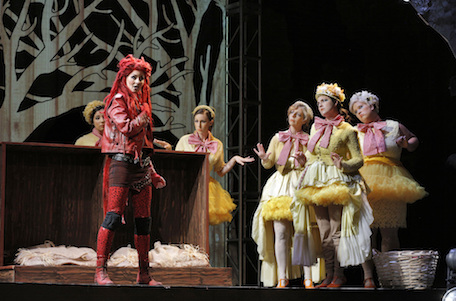Ah, Janacek, what music!
West Edge Opera opened their summer festival last weekend with the Czech composer’s Cunning Little Vixen. The 1924 opera, based on an illustrated serialized version of a novel about a roguish fox named Sharp Ears, is set in a rural world in which the lives of humans and animals intersect with such intensity that we, listeners and audience, seem to be witnessing something preternatural, something truly beyond our lives of tedious freeway driving and disaster-filled newspapers. A forest world filled with the whirring of insects, ribbets of frogs, and the swirling busyness of nature, all evoked by Janacek’s enchanting music.
The opera has two rather slim narrative threads, one human and one animal, which intersect through the Vixen and the Forester. The opera opens with the Forester resting by the edge of the forest. He captures a young Vixen and brings her home. His wife is less than pleased, but his ancient dog Lapák is thrilled. The music portraying the farm is filled with the squawking of chickens. In a daring escape, Vixen Sharp Ears kills the Wife’s chickens and vanishes into the forest. There she moves into an abandoned badger’s burrow, falls in love with a handsome Golden Fox and has heaps of cubs.
This tale of the Vixen’s adventures is interwoven with scenes from a human world where time seems stuck. The Pastor, the Schoolmaster and the Forester daydream in a bar, sharing their longings for the gypsy girl Terynka. Traveling home through the woods, the Schoolmaster and Pastor are teased by the Vixen, and for idealized moments the two female forces, gypsy and fox, intertwine and intersect. Sadly, the Poacher Harasta kills everyone’s daring fantasies, shooting the Vixen and marrying Terynka. The Forester closes the opera with a meditation on creation, and the life of the forest continues on, vital and insistent with the coming of age of the Vixen’s kit, another curious and cunning Little Vixen.
The opera is episodic and seething in its musical fluidity, and the orchestra, led by Jonathan Kuhner, conjured the natural world of the Vixen Sharp Ears in exquisite detail using Jonathan Dove’s orchestral reduction. The singers seemed to revel in the difficult music. Philip Skinner sang the enviable role of the Forester, and Amy Foote’s Vixen was lithe and brightly toned. She was matched warmly by mezzo-soprano Nikola Printz, in the role of Fox. Most of the animals are set in the soprano range, and members of the Piedmont East Bay Children’s Choir made eager critters: cricket, midge, grasshopper and frog. They also appeared as the Vixen’s kits, dressed like furry ragamuffins.
Bass Nikolas Nackley sang the darker roles of the Pastor and the Badger. And tenor Joseph Raymond Meyers lamented as the Schoolmaster and caroused as the Mosquito, syringe in hand. The Poacher was sung by Carl King. Mezzo Deborah Rosengaus sang Lapák the Dog, and Rachel Rush the Forester’s beleaguered Wife.
The costuming by Christine Cooke was gorgeous. She made only the slightest attempt to make the players look like animals. Forest animals were punked out: the Vixen in red leather jacket, short skirt, red tights and ankle boots. Her mop of a red wig had two tresses upstanding into short, sharply pointed ears. And the flock of chickens, sung by members of the Volti chorus, were divine in red-and-white gingham bows and yellow petticoats.
The sets by Sarah Phykitt were large flat trees painted white and embellished with urban detritus, across which lingered videos by Jeremy Knight. The projected images fell across the ceiling of the Oakland train station, opening up the stage and picturing the claim of the natural world on the decaying human world.
Only the direction and the choreography fell short of the opera’s vibrant allure. Director Pat Diamond left large gaps in the players’ action. There were moments when movement simply stopped and it was difficult to tell what was happening on stage. Mercifully, the music moved with its own luscious momentum. Choreographer Liz Tenuto’s dances worked for her as a dancer but seemed disconnected from the opera as a whole. At one point she just stood center stage as if she wasn’t sure what she was meant to do next. Only small attempts were made to convey the movements of animals as they are characteristically found, domestically and in the wild.
Despite these lapses, the production had boundless charm, buoyed along by the composer’s music, the adorable costuming and the singers’ voices.
– Jaime Robles
The final performance of West Edge Opera’s production of The Cunning Little Vixen is Saturday August 13, at 1 p.m. For information and tickets, visit westedgeopera.org.
Photo: Amy Foote as the Cunning Little Vixen thrills a flock of chickens in the Westedge Opera production of Janacek’s opera.

